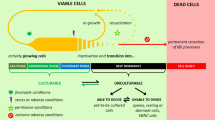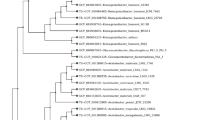Abstract
Thiosulfate (S2O3 2–) is a natural product that is widely utilized in natural ecosystems as an electron sink or as an electron donor. However, the major biological source(s) of this thiosulfate is unknown. We present the first report that taurine (2-aminoethanesulfonate), the major mammalian solute, is subject to fermentation. This bacterial fermentation was found to be catalyzed by a new isolate, strain GKNTAU, a strictly anaerobic, gram-positive, motile rod that formed subterminal spores. Thiosulfate was a quantitative fermentation product. The other fermentation products were ammonia and acetate, and all could be formed by cell-free extracts.
Similar content being viewed by others
Author information
Authors and Affiliations
Additional information
Received: 19 February 1997 / Accepted: 12 May 1997
Rights and permissions
About this article
Cite this article
Denger, K., Laue, H. & Cook, A. Thiosulfate as a metabolic product: the bacterial fermentation of taurine. Arch Microbiol 168, 297–301 (1997). https://doi.org/10.1007/s002030050502
Issue Date:
DOI: https://doi.org/10.1007/s002030050502




